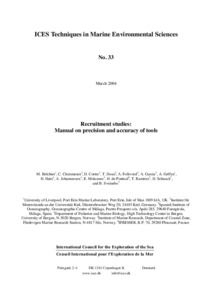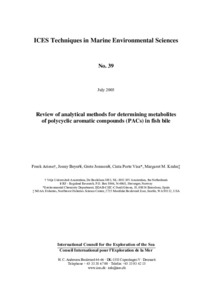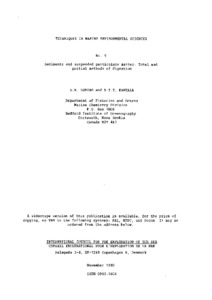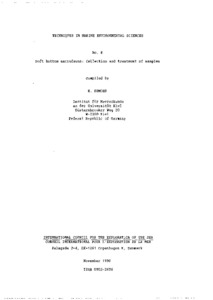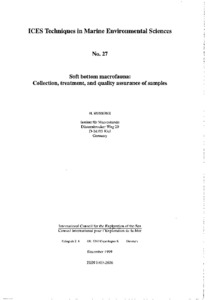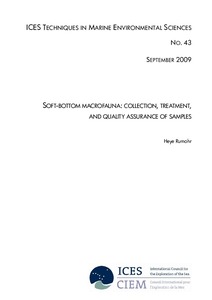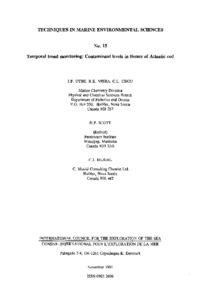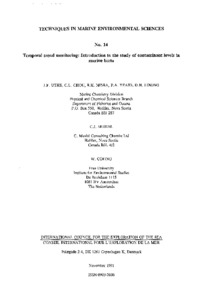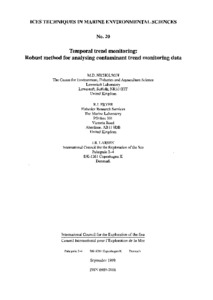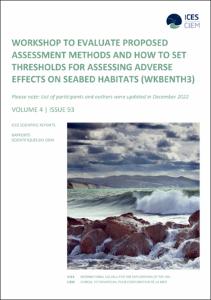Browsing ⇒ ICES: International Council for the Exploration of the Sea by Title
Now showing items 77-90 of 90
-
Recommendations for best practice in deep-sea habitat classification: Bullimore et al. as a case study.
(2014)We assert that the reef framework-forming coral, Solenosmilia variabilis Duncan, 1873, is sometimes incorrectly recorded as another coral, Lophelia pertusa (Linnaeus, 1758) in surveys of deep-sea habitat (e.g. Bullimore, ... -
Recruitment studies: manual on precision and accuracy of tools.
(International Council for the Exploration of the Sea (ICES), Copenhagen, Denmark, 2004)This manual is one of the results of the project Precision and Accuracy of Tools in Recruitment Studies (PARS), financed by the EU (FAIR-CT96–1371). The project PARS is concerned with improving the methodologies used in ... -
Review of analytical methods for determining metabolites of polycyclic aromatic compounds (PACs) in fish bile.
(International Council for the Exploration of the Sea (ICES), Copenhagen, Denmark, 2005)In fish, metabolites of polycyclic aromatic compounds (PACs) in gall bladder bile can be used as biomarkers for recent environmental exposure to PACs. These metabolites in the bile result from hepatic biotransformation ... -
Sediments and suspended particulate matter: Total and partial methods of digestion.
(International Council for the Exploration of the Sea (ICES), Copenhagen, Denmark, 1990)In order to determine the major and trace metal concentrations of marine sediments and suspended particulate matter by wet chemical methods, it is necessary to dissolve all or part of the s ... -
Soft bottom macrofauna: Collection and treatment of samples.
(International Council for the Exploration of the Sea (ICES), Copenhagen, Denmark, 1990)The aim of these recommendations 1 is to standardize the methods used by different scientists for long-term benthos surveys, in order to increase the comparability of results for different ar ... -
Soft bottom macrofauna: Collection, treatment, and quality assurance of samples.
(International Council for the Exploration of the Sea (ICES), Copenhagen, Denmark, 1999)The aim of these recommendations is to standardize the methods used by different scientists for benthos surveys in order to increase the comparability of results for different areas. The results of ICES/HELCOM Quality ... -
Soft-bottom macrofauna: collection, treatment, and quality assurance of samples.
(International Council for the Exploration of the Sea (ICES), Copenhagen, Denmark, 2009)These recommendations are intended to standardize the methods for benthos surveys used by different scientists to increase the comparability of results for different areas. The results of ICES/HELCOM Quality Assurance ... -
Supporting variables for biological effects measurements in fish and blue mussel.
(International Council for the Exploration of the Sea (ICES), Copenhagen, Denmark, 2017)Biological effects measurements in fish and blue mussel are fundamental in marine environmental monitoring. Nevertheless, currently used biomarkers may be confounded by basic physiological phenomena, such as growth, ... -
Suspended particulate matter: Collection methods for gravimetric and trace metal analysis.
(International Council for the Exploration of the Sea (ICES), Copenhagen, Denmark, 1990)Filtration is the most commonly used method for separating the dissolved and particulate fractions of seawater samples. A wide variety of filter types with different pore sizes has been used fo ... -
Temporal trend monitoring: Contaminant levels in tissues of Atlantic cod.
(International Council for the Exploration of the Sea (ICES), Copenhagen, Denmark, 1991)The study of trends in trace contaminant concentrations in marine species has been of interest to the International Council for the Exploration of the Sea (ICES) since the early 1970s. The ... -
Temporal trend monitoring: Introduction to the study of contaminant levels in marine biota.
(International Council for the Exploration of the Sea (ICES), Copenhagen, Denmark, 1991)The study of contaminants in marine species, sediments, and sea water has been of interest to the International Council for the Exploration of the Sea (ICES) since the early 1970s. The inve ... -
Temporal trend monitoring: Robust method for analysing contaminant trend monitoring data.
(International Council for the Exploration of the Sea (ICES), Copenhagen, Denmark, 1998)This document describes a new method of assessing contaminant trends in fish muscle, fish liver, and shellfish. Previous methods of assessing trend data have often been complicated by the need to respond to unusual ... -
Trace metals in sea water: Sampling and storage methods.
(International Council for the Exploration of the Sea (ICES), Copenhagen, Denmark, 1987)Sampling procedures for dissolved trace metals in sea water have progressed to the extent that it is now possible to describe reliable methods for the collection, preservation, and storage of ... -
Workshop to evaluate proposed assessment methods and how to set thresholds for assessing adverse effects on seabed habitats (WKBENTH3).
(International Council for the Exploration of the Sea (ICES), Copenhagen, Denmark, 2022)The Marine Strategy Framework Directive (MSFD) requires EU Member States to achieve and maintain good environmental status (GES) across their marine waters. WKBENTH3 convened as a hybrid meeting to evaluate benthic assessment ...
 Repository of community practices in Ocean Research, Applications and Data/Information Management
Repository of community practices in Ocean Research, Applications and Data/Information Management

